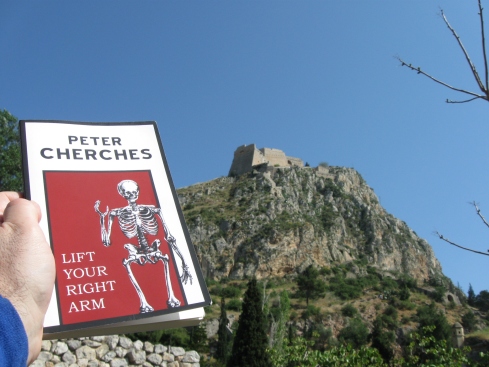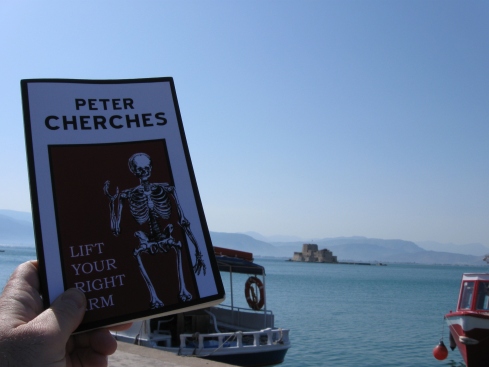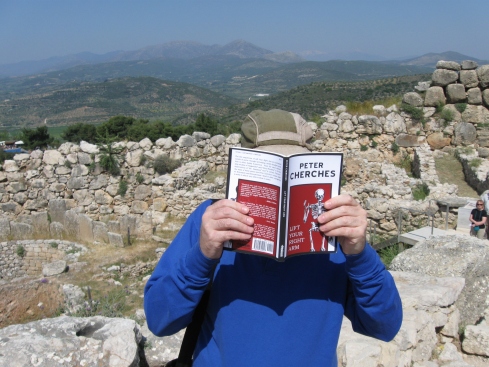From the Midwest Book Review, April 2013
19 Apr“There’s a bleak nature to the world that takes a certain level of humor to truly appreciate. ‘Lift Your Right Arm’ is a collection of short fiction from Peter Cherches, of as he states it, minimalist novels. Presenting a very dark brand of humor that is sure to entice many a reader, ‘Lift Your Right Arm’ is a must for those who see the down side of life, and want to learn to love it.”
Another “Bagatelles” Outtake
16 AprIt’s hard to remember, 30 years later, why this one didn’t make the cut, but I think the tone just didn’t work for me when I was deciding on which pieces to keep in “Bagatelles.”
She was showing signs of illness. Symptoms. She was exhibiting manifestations of something not quite right. I began to take stock of these symptoms. I catalogued them with relish. I considered the implications of these manifestations. I considered them in great detail. I considered the relationships among the symptoms. I systematically separated those symptoms which appeared to be truly symptomatic of her condition from those I deemed less relevant. I then reconsidered this vast system of symptoms and the considerable effects it was having on her own system. I was making great strides in my consideration of her symptoms, in my systematic symptomatology, as it were, when she interrupted my thought processes with a particularly vulgar utterance.
I feel sick, she said.
“A Certain Clarence,” Outtake #1
14 AprAnd stay tuned for the companion ebook volume of Lift Your Right Arm outtakes to be released later this year at a price you won’t be able to refuse.
Taking his daily constitutional, Clarence runs into a woman of the neighborhood, of indeterminate age, who seems to have taken a liking to Clarence, and often speaks to him. “Hello, young man,” the woman says, and Clarence, as always, wonders if, and by what definition, he may be considered a young man. This time the woman addresses the most recent speech by the President. “Did you see him on the TV last night?” the woman asks. “He’s a crook, a liar and a phony,” she says. “There hasn’t been an honest man in the White House since Wendell Wilkie.”
Clarence smiles, agrees with the woman, and walks on, wondering what it would be like to inhabit a universe in which Wendell Wilkie was once President.
Trio Bagatelles Outtake #3
10 AprOne: I’m freezing my ass off. And don’t say anything. It’s a figure of speech.
Two & Three: Who’s saying anything?
One: I know you two. Any time I say something you pick it apart.
Two: It’s only because we care.
One: Sure. All you care about is having fun at my expense.
Three: I think you’re really upset.
One: You’re damn right I’m upset. I’m tired of having my every word analyzed.
Two: I think we generally analyze at the sentence level.
One: You see!
Three: See what?
One: You don’t get it, do you?
Two: What we get is that you’re making a mountain out of a molehill.
One: Sure, you say “mountain out of a molehill” and I’m supposed to accept it. But if I said it all hell would break loose.
Two: Calm down. Take it easy.
Three: Yeah, chill.
One: Chill? I’m freezing my ass off!
Two & Three: Would you like a sweater?
One: Sure! Thanks!
Let’s Get Irreal
3 AprThe Cafe Irreal, an online journal, was the first place to publish excerpts from “Mr. Deadman,” back in 2008, when it was a work-in-progress. In web time it’s a venerable journal, having been online since 1998. It features non-realistic writing in the tradition(s) of Kafka, Borges, and Calvino, to name a few of the most important literary forbears. Irrealism is one of a number of overlapping terms that have been applied over the years to non-realistic, “non-traditional” literature. When I was getting started as a writer in the ‘seventies, the term was very much in vogue. Other terms that were used to describe the type of writing that I was attempting and being influenced by included “experimental,” “innovative,” and that old favorite, “avant garde.”
For me, all of these terms are limited and limiting. I find “experimental” and “innovative” too descriptive of process or intent, too slippery and vague when it comes to actually describing the work, and needlessly scary to many readers who would probably enjoy much of this work. To a great degree, there was a certain self-congratulatory trap that experimental/innovative writers fell into back in the ‘seventies, some implicitly and others explicitly claiming an esthetic (and sometimes moral) superiority for these approaches while John Gardner, Cynthia Ozick, and Tom Wolfe, among others, were even more hysterically arguing that these writers were a threat to literature, morality, and western civilization.
To call something “avant garde” in the 21st century would be both silly and presumptuous. “Irreal” is, I think, too much of a shibboleth to be wholly adequate.
Anyway, as I was thinking about terminology some time ago I came up with a term that works for me: “alternate mindset literature.” It’s writer-centered and it’s open-ended, but it limns a territory apart from realistic literature without carrying a value judgement about that which it is not.




